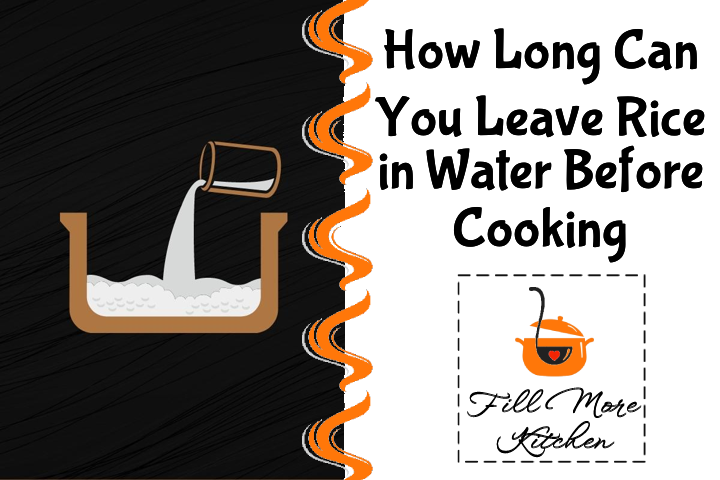Soaking and rinsing rice before cooking is a traditional method used in many rice dishes, particularly in Asia, to enhance its texture and taste.
According to experts, rice can be soaked for a maximum of 2 hours without losing its taste and consistency, but it is recommended to soak it for only 30 minutes. Soaking rice for an extended period can cause illness and spoil the dish. However, if soaked between 30 minutes to 2 hours, the rice can have improved texture and delicious flavors.
Soaking rice is only necessary to enhance its taste and texture, and not for any health-related purposes.
The duration of soaking rice before cooking also varies based on the type of rice being prepared, with short-grain white rice being a familiar variety in the western world.
However, considering the numerous types of rice available, what occurs when we immerse them in water? And what are the consequences of soaking them for more than two hours?
What Happens if You Soak Rice for Too Long?
Soaking rice is a common practice among cooks, as it can alter the texture of the rice to be softer or spongier and remove any excess starch.
Leaving rice soaked in water for an extended period in the fridge may result in the growth of bacteria. If you soak rice at room temperature, it should not be kept for more than 2 hours, and if you soak it in the refrigerator, it should not be kept for more than 24 hours. However, soaking rice for such a long time in the fridge is not advisable as it can affect its taste and texture.
Soaking rice in water before cooking can reduce its stickiness. To maintain its firmness and desired flavor and texture, it is recommended not to exceed 30 minutes of soaking time.
If you prefer your rice to have a smoother and creamier texture with less differentiation between individual grains, soaking it for two hours before cooking will likely result in a much softer consistency.
It is important not to exceed 2 hours when soaking rice at room temperature, as leaving cooked or uncooked rice at room temperature for longer than 2 hours can lead to the growth of harmful bacteria.
If you go beyond the time limit for soaking rice, you can avoid spoilage by refrigerating it.
How Should You Store Your Pre Soaked Rice?
If you have pre-soaked rice, it is recommended to keep it in an airtight container and store it in the refrigerator instead of just covering it with plastic wrap or aluminum foil.
Aluminum foil and plastic wrap are ineffective in preventing the absorption of flavors by rice stored in the refrigerator.
It is common for refrigerators to have a particular smell, particularly if there are numerous leftovers or pungent vegetables and herbs stored inside.
If you add herbs or vegetables to your rice, their aroma can influence the flavor of the rice.
If you opt to freeze your rice, whether it is cooked or soaked uncooked, it can be stored in a sealed bag; however, it is crucial to use a freezer-grade storage bag that has a zipper lock.
Avoid using a bag that can be sealed by pressing it together and opt for a vacuum seal bag when storing rice in the freezer.
Using a vacuum seal bag can prevent freezer burn and unwanted odors, but it is not advisable to use it for storing rice in the refrigerator as it would be a wasteful use of vacuum sealing.
For efficient storage of rice, it is recommended to use an airtight reusable container as refrigeration can only keep rice fresh for a limited number of days.
Can You Put Soaked Rice in the Refrigerator?
If you soak rice and strain it, you can refrigerate it for up to 48-72 hours before cooking, but make sure not to store it in water as rice commonly carries potentially harmful bacillus bacteria that can cause food poisoning. If you keep the rice in the fridge for more than a day while soaking in water, it will lose its integrity and develop a rancid smell.
It is not recommended to keep rice that has been soaked in water for more than 2 hours without cooking or refrigerating it, as tepid water at room temperature can promote bacterial growth.
If you think that the rice has been left for a significant period, it is advisable to discard it and begin again.
If you want to enhance the texture of your rice, soaking it for approximately 30 minutes is sufficient, and don’t forget to rinse it thoroughly to eliminate the starch.
If you want to achieve chewy and less sticky rice, it is recommended to store the drained and rinsed soaked rice in the fridge for a maximum of three days.
This uncooked rice has been soaked. To avoid the growth of bacteria and germs, it is recommended to soak it for no more than an hour at room temperature. After straining, refrigerate the rice immediately.
Rice should not be left soaking in water for more than 12-24 hours in the refrigerator as it can cause a buildup of starch, resulting in a foul-smelling film on top of the water and potentially promoting bacterial growth.
Leaving rice in water for too long can cause it to break down and potentially lead to illness if consumed. While not necessarily fatal or harmful in the long run, the taste will be affected and it may cause discomfort in the stomach.
Do You Need to Soak Rice Before Cooking It?
Do you need to soak rice before cooking it? The answer is no. Although there are reasons why you might want to soak your rice, it is not required. Unlike dried beans that require soaking and rinsing to remove toxins, rice does not have this issue, so there is no safety concern with skipping the soaking step.
While it is not necessary to soak rice before cooking, doing so can provide some advantages, such as reducing the cooking time, which is the most apparent benefit.
Indeed, the water is absorbed by the fibers of the rice during soaking, resulting in a softer texture and faster cooking time.
If you consume a large amount of rice, it may be beneficial to soak a few cups of rice in water and refrigerate it, allowing for the preparation of fresh-tasting rice for up to three days.
Ensure that you have a consumption plan in place, as leaving soaked rice unused can result in wastage since it cannot be returned to the container with the dry grains.
The decision to soak rice before cooking depends on the type of rice being used, as some people prefer to do so in order to enhance its flavor.
It is believed that soaking certain types of rice can enhance their distinct and more unusual flavors.
Let’s explore further which types of rice require soaking prior to cooking.
What kinds of rice should I Soak?
Short grain brown and white rice are not particularly tasty varieties of rice. Their flavor is quite plain, so people usually add basic seasonings like salt or chicken broth to improve it.
However, there exist other varieties of rice apart from short-grain that can benefit from a brief period of soaking.
Jasmine rice: With a flavor that is not too strong, but nutty and reminiscent of popcorn, Jasmine rice is similar to Basmati rice in taste. However, the difference lies in the length of the grain as Jasmine rice has long-grain while Basmati has short-grain. To enhance its distinct flavor, soaking Jasmine rice can be beneficial.
Arborio rice: With a firm and sticky texture, Arborio rice is a type of short-grain rice that benefits from soaking (without rinsing) to enhance its sweet and creamy flavor. Although some claim it is similar to short-grain white rice, we disagree as Arborio has a much creamier consistency and a pleasant sweet undertone that regular rice lacks.
Wild rice (black rice): Soaking wild rice or black rice before cooking is highly recommended for better results. Although not mandatory, this type of rice is very tough and may retain some of its hardness even after prolonged cooking if not soaked beforehand.
You can also check this video about “How Long Can You Leave Rice in Water Before Cooking?”
Check out our top 10 reviews!
Related posts
https://fillmorekitchen.com/9-restaurants-that-have-great-dollar-menus/
https://fillmorekitchen.com/how-to-tell-if-something-is-dishwasher-safe/
https://fillmorekitchen.com/what-to-do-the-first-time-using-a-new-oven/
https://fillmorekitchen.com/can-you-take-a-pressure-cooker-on-a-plane/
https://fillmorekitchen.com/what-meat-is-best-to-dehydrate/



